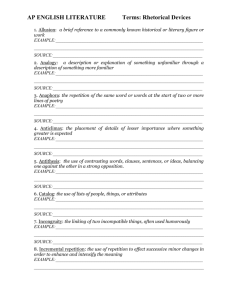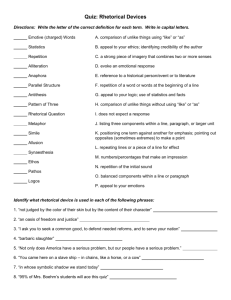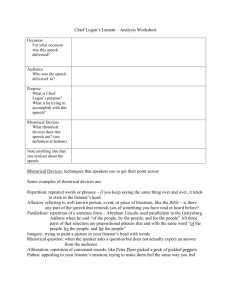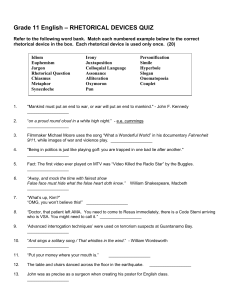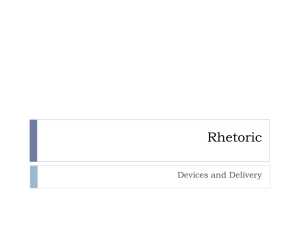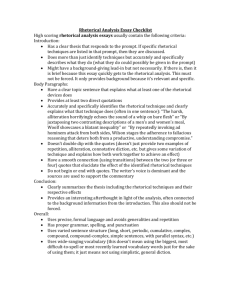Rhetorical Devices
advertisement
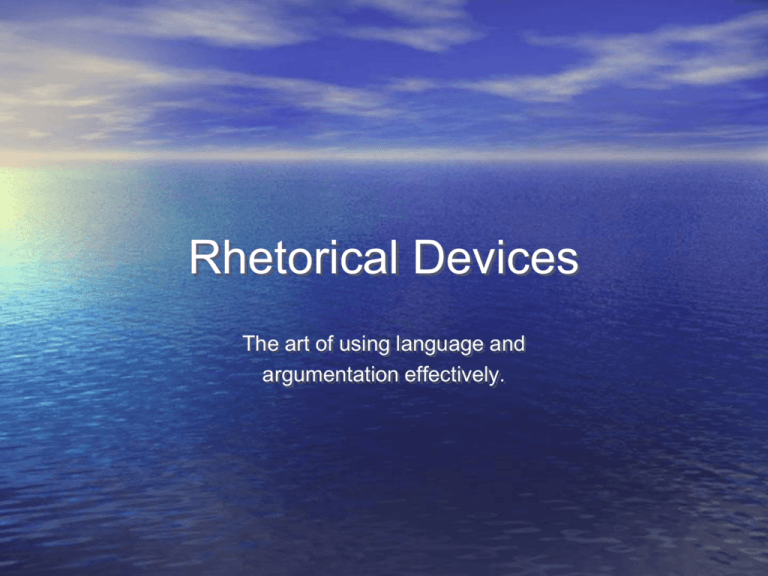
Rhetorical Devices The art of using language and argumentation effectively. What are rhetorical devices? • techniques an author uses to evoke an emotional response to manipulate an audience’s thoughts, reactions, and impressions • they are used for emphasis, association, clarification, focus, organization, transition, arrangement, decoration, and variety Alliteration • Repetition of the initial consonant sounds beginning several words in sequence. – "....we shall not falter, we shall not fail." (President G.W. Bush Address to Congress following 9-11-01 Terrorist Attacks.) – "Let us go forth to lead the land we love.“ (President J. F. Kennedy, Inaugural 1961) – "Veni, vidi, vici.“ (Julius Caesar - “I came, I saw, I conquered”) Alliteration in Advertising • Can you identify alliteration in this advertisement for Walgreens? Allusion • A reference to someone or something that is known from history, literature, art, religion, politics, sports, science, mythology, folk tales or some other branch of culture --“Is it so bad then to be misunderstood? Pythagoras was misunderstood, and Socrates …and Copernicus, and Galileo, and Newton…To be great is to be misunderstood.” (“Self Reliance” by Ralph Waldo Emerson) – What figure from mythology is being alluded to in this cartoon? Antithesis • A rhetorical device in which two ideas are directly opposed. – “It was a blessing and a curse.” Chiasmus • Rhetorical inversion of the second of two parallel structures. – “He went to the country, to the town went she.” Counterargument • A way to appeal to logos (logic) by anticipating objections or opposing views • Strengthens argument because it shows you’ve carefully considered your subject • In acknowledging a counterargument, you agree that an opposing argument may be true, but then you deny the validity of all or part of the argument Diction • A speaker’s or writer’s choice of words • Diction can be formal, informal, colloquial, full of slang, poetic, etc. • Diction has a powerful effect on the tone of a piece of writing Juxtaposition • The arrangement of two or more ideas, characters, actions, settings, phrases or words side by side in order to compare/contrast the two • Writers often juxtapose gentle characters with violent characters, old characters with young characters, and rich characters with poor characters • Set up a character as being popular with the opposite sex then reveal s/he is a virgin • Showing images of war, violence, and poverty with the song “What a Wonderful World” playing in the background Parallelism • Repetition of same or similar grammatical structures • One of the most useful and flexible rhetorical devices – "....we shall not falter, we shall not fail." (President G.W. Bush Address to Congress following 9-11-01 Terrorist Attacks.) – “…that government of the people, by the people, for the people shall not perish from the Earth.” (President Abraham Lincoln Gettysburg Address) – “Tell me, and I forget. Teach me, and I may remember. Involve me, and I will learn.” (Benjamin Franklin) Repetition • When an author or speaker repeats a word, phrase, or idea more than once • The rhetorical reasons for using repetition are: • Emphasizes importance of word, phrase, or idea • Ensures audience is paying attention (something important coming) Types of Repetition • Anadiplosis – repetition of a prominent word as the last and first word of two phrases or clauses; it ties the sentence to its surroundings – “The mountains look on Marathon— And Marathon looks on the sea…” Lord Byron • Anaphora – the repetition of introductory words or phrases for effect. – “It was the best of times, it was the worst of times, it was the age of wisdom, it was the age of foolishness, it was the epoch of belief, it was the epoch of incredulity” – Charles Dickens • Epanalepsis – repetition at the end of a clause of the word that occurred at the beginning of the clause – “Next time there won’t be a next time.” • Epistrophe – repetition of the same word or group of words at the ends of successive clauses – “The government is of the people, by the people and for the people.” Rhetorical Question • A question asked for effect and that does not actually require an answer because the answer should be obvious – “Are fleets and armies necessary to a work of love and reconciliation?… Has Great Britain any enemy, in this quarter of the world, to call for all this accumulation of navies and armies?” (Patrick Henry, “Speech to the Virginia Convention”) – “It is really time to ask ourselves, ‘How can we allow the rich and powerful, not only to rip off people as consumers, but to continue to rip them off as taxpayers?” (Ralph Nader, 2000 NAACP Convention Address) Hyperbole • obvious exaggeration for emphasis or effect – I have a million things to do today. – I told you a thousand times! – When I was a kid, I had to walk fifteen miles to school uphill in five feet of snow. Sarcasm (Verbal Irony) • Usually a harsh, personally directed comment • Saying one thing, yet meaning something else – Referring to a someone as “a delight” when he/she is miserable to be around – In Romeo and Juliet, when Romeo asks Mercutio if his wound is slight, Mercutio responds, “Aye, a scratch” Understatement • A statement that says less than what is meant • The opposite of hyperbole – If you are sitting down to enjoy a ten-course meal and say, “Ah! A little snack before bedtime,” you are using an understatement to emphasize the tremendous amount of food you are about to eat – “I have to have an operation. It isn’t very serious. I have this small tumor in my brain.” Polysyndeton • Deliberate use of many conjunctions for special emphasis – to highlight quantify or mass of detail or to create a flowing, continuous sentence pattern. • EX: The meal was huge – my mother fixed green beans and ham and apple pie and green pickled tomatoes and ambrosia salad and all manner of fine country food – but no matter how I tried, I could not consume it to her satisfaction. Asyndeton • Deliberate omission of conjunctions in a series of related clauses. • EX: “I came, I saw, I conquered” (Julius Caesar). Zeugma • The use of a verb that has two different meanings with objects that complement both meanings. • EX: He stole both her car and her heart that fateful night. Stichomythia • Dialogue in which the endings and beginnings of each line echo each other, taking on a new meaning with each new line. Hamlet: Now mother, what’s the matter? Queen: Hamlet, thou hast thy father much offended. Hamlet: Mother, you have my father much offended. Queen: Come, come, you answer with an idle tongue. Hamlet: Go, go, you question with a wicked tongue. Rhetorical Devices in Ads • How many rhetorical devices can you find? Parallelism Alliteration Repetition Rhetorical Devices in Ads • How many rhetorical devices can you find? Alliteration Rhetorical Question Hyperbole Rhetorical Device Review 1) What rhetorical device is being used in this line from Sojourner Truth’s speech? “That man over there says that women need to be helped into carriages … Nobody ever helps me into carriages …And ain’t I a woman?” a) b) c) d) Alliteration Counterargument Understatement Parallelism Rhetorical Device Review 2) Change the underlined portion of the sentence below to make the diction more formal. “He invented a really nifty device called the telephone.” a) super terrific b) truly innovative c) incredibly amazing d) really useful Rhetorical Device Review 3) “I’m so hungry I could eat a horse” is an example of what rhetorical device? a) juxtaposition b) sarcasm c) hyperbole d) understatement Rhetorical Device Review 4) “I’m just taking a little trip up Mount Everest” is an example of what rhetorical device? a) juxtaposition b) alliteration c) hyperbole d) understatement Rhetorical Device Review 5) What rhetorical devices are being employed in the following famous book passage? “It was the best of times, it was the worst of times, it was the age of wisdom, it was the age of foolishness, it was the epoch of belief, it was the epoch of incredulity, it was the season of Light, it was the season of Darkness, it was the spring of hope, it was the winter of despair, we had everything before us, we had nothing before us, we were all going direct to Heaven, we were all going direct the other way - in short, the period was so far like the present period, that some of its noisiest authorities insisted on its being received, for good or for evil, in the superlative degree of comparison only.” ~from A Tale of Two Cities by Charles Dickens a) Juxtaposition b) Parallelism c) Repetition d) All of the above
